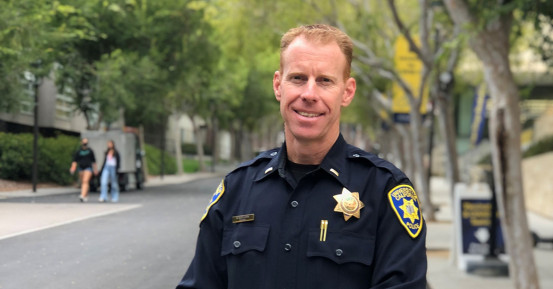NSF-Funded Program Advances Geosciences Opportunities for Community College Students
Semester-long research experience at Scripps Oceanography educates the next generation of scientific leaders
Story by:
Published Date
Article Content
For the second year, a group of community college students has been immersed into cutting-edge research at Scripps Institution of Oceanography at UC San Diego.
The students are a part of the Scripps Geosciences Educational Opportunities (Scripps-GEO) program, a semester-long experience where community college students are exposed to research opportunities at Scripps Oceanography. The program aims to provide experience and knowledge in geosciences, as well as ocean and atmospheric sciences.
The Scripps-GEO program was funded by the National Science Foundation’s GEOPaths program in 2020, but the COVID-19 pandemic postponed the start of the program until January 2022. The late Scripps Teaching Professor Jane Teranes created the program in hopes of introducing community college students to research and encouraging transfers to undergraduate programs at Scripps.
Following the passing of Teranes in the summer of 2022, the program has carried on thanks to the efforts of Scripps Oceanography faculty members Cathy Constable, Emily Chin and several other Scripps colleagues.
“Jane made a wonderful start with this program and it's a privilege to be able to continue her efforts,” said Constable, professor of geophysics at Scripps. “The research internship experience goes beyond the traditional classroom experience and highlights a path to opportunities available after transfer to four-year universities. It's great getting to work with and encourage a group of highly motivated students so early in their careers, and we hope to see several of them continue their engagement with Scripps' education and research in the future.”
There are 13 students, known as GEO-Scholars, taking part in this year’s program. GEO-Scholars conduct research through paid internships with Scripps scientists including Colleen Petrik, Wenyuan Fan, Melissa Carter, Ross Parnell-Turner, Lynn Russell and others. Students work approximately 10 hours a week, engaging in hands-on activities including researching in labs, learning lab techniques, instruction in how to code and more.
In addition to research training, the program provides mentoring and workshops to prepare students for careers at four-year universities and careers in science, technology, engineering and mathematics (STEM). At the end of the program in May, students showcase and present their semester-long research findings to academics, professionals and other students at the Mesa College Research Conference.
The Scripps-GEO program is for undergraduate students currently enrolled in the following San Diego-area community colleges: Mesa College, San Diego City College, Mira Costa College, Southwestern College, and Miramar College. Geoscience and STEM colleagues at the community colleges assist Scripps in encouraging students to apply for the program.
“As a community college instructor, I'm deeply grateful that our students have the opportunity to work with the world-class researchers at Scripps,” said Donald Barrie, a geology professor and student mentor at Mesa College. “Opportunities like the Scripps-GEO program are transformative because students get to experience the thrill of scientific discovery for themselves. Now, more than ever, we need to cultivate the next generation of geoscientists, and this is what Scripps excels at.”
Application information for the spring 2025 program will be available this fall. Please contact Cathy Constable (cconstable@ucsd.edu) or Emily Chin (e8chin@ucsd.edu) for more information about the Scripps-GEO program.
We asked several GEO-Scholars about their experience in the 2024 Scripps-GEO program. Learn more about the students below.
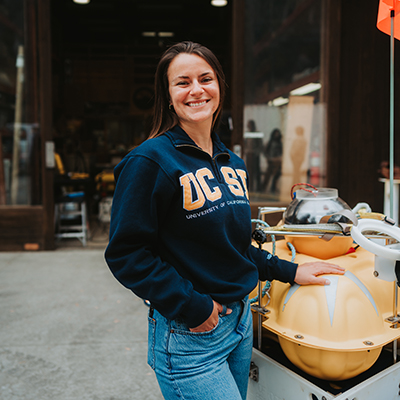
Holly Ross is currently attending San Diego Mesa College and majoring in biology. Ross served as a boatswain’s mate in the United States Coast Guard for six years, and now interns at Scripps with geophysics professor Wenyuan Fan.
Why were you interested in coming to Scripps for this opportunity?
I was interested in interning at Scripps Institution of Oceanography because UC San Diego has always been my dream school. After six years in the U.S. Coast Guard, this position represents my first opportunity in the civilian sector. The Scripps-GEO program offers me the chance to work alongside professors and engage in meaningful research. Given my background of working at sea, Scripps Institution of Oceanography was the perfect setting for me to combine my passion for the ocean and scientific research.
What are you currently studying? What research are you working on at Scripps?
I am pursuing a degree in biology at San Diego Mesa College and transferring to UC San Diego as a junior this fall. Participating in the STEM-focused Scripps-GEO program allowed me to explore areas beyond my major. My research project concentrates on analyzing the frequency and size distribution of submarine landslides in the Gulf of Mexico. Under the guidance of Scripps geophysics professor Wenyuan Fan we are developing a detailed map of submarine landslides in the western Gulf of Mexico and evaluating the associated risks, including tsunamis and damage to offshore infrastructure.
How has your experience been so far? What is your favorite part about the program?
My experience has been incredible. I've enjoyed collaborating with other STEM students and professors. In particular, I've enjoyed hearing professors discuss their data and share stories from their research trips abroad. My favorite part of the program has been working on my project at the Pinpoint Cafe, sipping coffee while overlooking Scripps Pier and watching the waves!
What do you hope to gain from this experience?
This experience has taught me how to conduct scientific research, think creatively, and develop new skills, such as designing a scientific poster to highlight our methods and findings. My main goal with this opportunity is to better understand my academic and career aspirations. The Scripps-GEO program has provided valuable insights and guided my future direction by exposing me to potential career paths.
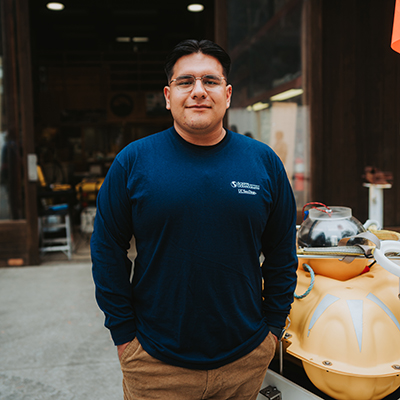
Jose Segura Figueroa is currently attending San Diego City College majoring in geology. Last year, he was accepted to programs that took him to places like the eastern Sierra Nevada, Berlin-Ichthyosaur State Park, Grand Canyon, and Rainbow Basin. During these experiences, he fell in love with doing field work.
Why were you interested in coming to Scripps for this opportunity?
I was drawn to the Scripps-GEO program primarily because of my deep-rooted passion for geosciences and my aspiration to pursue a career as a geoscientist. From an early age, I've been captivated by the intricate workings of our planet, especially in areas like geology, volcanology and earth sciences. The program offered an exceptional chance to immerse myself in research, providing invaluable exposure to real-world scientific inquiry. Moreover, it presented a unique opportunity to gain hands-on experience and insight into the path I envision for my future career in geosciences.
What are you currently studying? What research are you working on at Scripps?
I'm currently collaborating with mentor Professor Emily Chin and Professor Jeffrey Gee on a research project examining the textures and microstructures of rock samples from the Poe Mountain Intrusion in Wyoming's Laramie Anorthosite Complex. Our goals include gaining insights into the region's geological history and the processes shaping the North American continent. We aim to use rock texture to understand deformation processes, delve into mineralogy and petrology and utilize Matlab and MTEX software. This work sheds light on a significant period in Earth's history marked by large-scale magmatic processes shaping the crust.
How has your experience been so far? What is your favorite part about the program?
From diving into lab work to connecting with the community, every moment has been welcoming and enriching. The highlight of my experience has been the Friday seminars, where we delve into the fascinating realms of Earth, atmosphere, and ocean sciences. These sessions not only broaden our understanding but also fuel our passion for exploration. Through hands-on research projects, we're actively honing our skills in data interpretation and scientific inquiry. Looking ahead, I'm excited about the opportunities to visit research facilities, engage with experts from academia and industry, and refine our job-seeking skills. Each day brings new discoveries and challenges, shaping us into well-rounded professionals ready to make a difference in the world of science. Scripps has become more than just a place of study; it's a community where curiosity thrives and dreams take flight.
What do you hope to gain from this experience?
From this experience, I hope to gain a multifaceted set of skills, knowledge, and insights that will serve as a solid foundation for my future endeavors in the field of geosciences. Specifically, I aim to deepen my understanding of geologic processes, scientific research methodologies, and develop critical thinking and problem-solving skills essential for addressing complex research. I also aspire to cultivate a network of mentors, peers, and professionals within the scientific community, fostering collaborative relationships and opportunities for continued growth and learning. Ultimately, I hope this experience will not only enrich my academic and professional journey but also empower me to make meaningful contributions to the understanding of our planet.
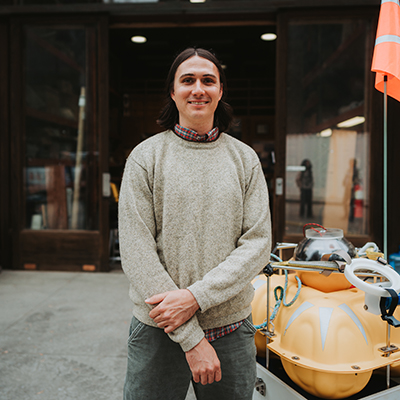
Daniel Self is currently attending Southwestern College and will transfer to San Diego State University (SDSU) in the fall to study electrical and computer engineering. He was a participant in the NASA Community College Aerospace Scholars program at Ames Research Center. He is passionate about research and technology and how the two can be combined to improve society.
Why were you interested in coming to Scripps for this opportunity?
I have wanted to contribute to scientific research since I started at community college. I imagined the discovery of a new idea or phenomenon would be a fulfilling achievement. As I learned more about the research community, I became aware of the reputation Scripps Institution of Oceanography holds within the world of groundbreaking research. When this opportunity became available, I knew immediately that I wanted to be involved.
What are you currently studying? What research are you working on at Scripps?
I am currently studying computer and electrical engineering and will transfer to SDSU in the fall. My research at Scripps is focused on heat waves and weather patterns in Southern California. I analyzed weather station data to see how heat waves are related to various weather patterns that can occur in this region. This research provides insight as to how heat waves might ultimately affect public health, notably in the form of excessive heat and wildfires. The results from my analysis should improve the predictability of these adverse situations.
How has your experience been so far? What is your favorite part about the program?
My experience so far has been amazing, I feel fortunate to work at this beautiful campus. My favorite part of the program is the people I work with. At Scripps’ SoCal Heat Hub, I have two mentors, Rachel Clemesha and Kristen Guirguis, who have inspired me so much. I have learned so much from them and now hope to continue my involvement with geosciences, even though I am an engineering major. Another inspiration is my poster co-author, Alexander Weyant, whose background in physics/math has shown me it’s possible to have a diverse education before working in geoscience.
What do you hope to gain from this experience?
This experience has already opened my eyes to so many possibilities for my future. I am more confident than ever in myself and the path I am on. The weekly talks from Scripps scientists, lab tours, poster projects, and hands-on experiences have all been incredible. I am deeply inspired by the subject matter I have been exposed to. I only hope that Scripps will continue to be a part of my education or career, because it is such a rewarding environment to be in.
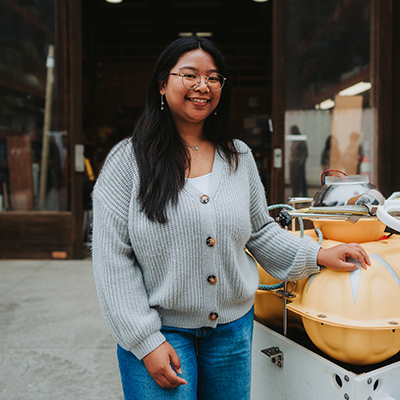
Louise Tibia is currently attending Southwestern College and will be transferring to a four-year university in fall 2024. After transferring, she plans on completing a bachelor’s degree in environmental sciences. She is passionate about biology, chemistry and teaching.
Why were you interested in coming to Scripps for this opportunity?
Having grown up in San Diego, I've long admired UC San Diego's renowned research endeavors, particularly the groundbreaking work conducted at Scripps Institution of Oceanography in areas such as climate change, conservation, and biodiversity. It was a no-brainer for me to take the opportunity to contribute to this legacy and immerse myself in an environment full of scientific advancements.
What are you currently studying? What research are you working on at Scripps?
Under the Scripps-GEO program, I am working with Dr. Lynn Russell's lab to study atmospheric chemistry. My research focuses on investigating the dependence of liquid water content on cloud droplet distribution. While my background initially leaned towards biology and conservation, my time here has sparked an interest in atmospheric chemistry, and I hope to explore other subtopics under geoscience.
How has your experience been so far? What is your favorite part about the program?
This has been an invaluable experience to me, and I am so grateful for the opportunity to be a Scripps-GEO Scholar. This is my first ever research experience, and my favorite part is how supportive the community is. I’d like to give a special shoutout to the graduate students under Dr. Lynn Russell’s lab for their continuous guidance in my research process, as well as my program coordinators for making all of this a reality. Overall, my peers have inspired the type of researcher and student I hope to be.
What do you hope to gain from this experience?
In the future, I intend on attending graduate school and eventually working as a professor in community colleges. This internship serves as a foundational step towards understanding the intricacies of the research process, which will undoubtedly help me with my future plans. I aspire to introduce more geoscience programs at the community college and high school levels, encouraging the next generation of passionate students.
Share This:
You May Also Like
Stay in the Know
Keep up with all the latest from UC San Diego. Subscribe to the newsletter today.

